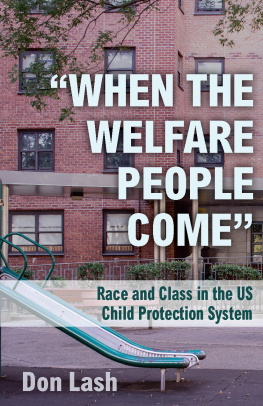THE BUREAUCRAT AND THE POOR
The Bureaucrat and the Poor
Encounters in French Welfare Offices
VINCENT DUBOIS
University of Strasbourg, France
Translated from French by Jean-Yves Bart
First published 2010 by Ashgate Publishing
Published 2016 by Routledge
2 Park Square, Milton Park, Abingdon, Oxon OX14 4RN
711 Third Avenue, New York, NY 10017, USA
Routledge is an imprint of the Taylor & Francis Group, an informa business
Copyright Vincent Dubois 2010
Vincent Dubois has asserted his right under the Copyright, Designs and Patents Act, 1988, to be identified as the author of this work.
All rights reserved. No part of this book may be reprinted or reproduced or utilised in any form or by any electronic, mechanical, or other means, now known or hereafter invented, including photocopying and recording, or in any information storage or retrieval system, without permission in writing from the publishers.
Notices:
Product or corporate names may be trademarks or registered trademarks, and are used only for identification and explanation without intent to infringe.
Originally published in French as La vie au guichet: Relation administrative et traitmente de la misre, by Economica, Paris 2010 (1st edition 1999).
British Library Cataloguing in Publication Data
Dubois, Vincent, teacher of sociology and political science.
The bureaucrat and the poor : encounters in French welfare offices.
1. Public welfare administrationFrance. 2. Public welfareFranceOfficials and employeesAttitudes. 3. Public welfareFranceOfficials and employeesPublic opinion. 4. Public opinionFrance. 5. Welfare recipientsFranceAttitudes. 6. BureaucracyFrance.
I. Title
362.580944-dc22
Library of Congress Cataloging-in-Publication Data
Dubois, Vincent, 1966-
The bureaucrat and the poor : encounters in French welfare offices / by Vincent Dubois.
p. cm.
Includes bibliographical references and index.
ISBN 978-1-4094-0289-3 (hardback)
1. Public welfareFrance. 2. Human servicesFrance. 3. FranceSocial policy1995-
I. Title.
HV265.D813 2010
362.5560944dc22
2010015523
ISBN: 9781409402893 (hbk)
Contents
Acknowledgements
When my colleagues Annie Collovald (University of Nantes) and Philippe Corcuff (University of Lyon) suggested this research to me, I did not think that it would become a book, let alone that it would be published in English one day. I would like to thank them for the opportunity they gave me and for their generous and communicative sociological imagination. This research was commissioned by the Caisse Nationale des Allocations Familiales (Paris), where Evelyne Renaudat and the late, lamented Pierre Strobel were very helpful. Thanks also to my wife Rime and to all friends and colleagues who helped me for the first French version of this book: Christophe Bouillaud, Patrick Bruneteaux, Frdric Caille, Delphine Dulong, Bastien Franois, Didier Georgakakis, Bertrand Ravon and Oliver Wohinsky.
The research grant of the Institut Universitaire de France made this translation possible. Jean Pavlevsky at Economica and Claire Jarvis at Ashgate were very helpful in completing the publishing process. The caricature on the cover is reproduced with the authorisation of Plantu and the assistance of Chantal Meyer. I thank both of them for their kind help. I am grateful to Steven Maynard-Moody who kindly accepted to write a thought-provoking and very useful foreword. Joseph Carew, Emilie Courtin, Cristina Fernandez, Jay Rowell, Jane Stenhouse, Jesse David Tatum and my sons Antonin and Lo all contributed to this English version in different ways. But above all I want to thank Jean-Yves Bart, with whom I have had so many interesting conversations during these months of cooperation and not only on linguistic issues for his great translation work.
This book is dedicated to the memory of Jacques Lagroye, deceased on 1 March 2009, who will remain with me, as for many French colleagues, an inspiration, both for his professional and human qualities.
Foreword
Steven Maynard-Moody
For those of us whose college French is long forgotten (and was never good enough), this English translation of Vincent Dubois book, La Vie au Guichet: Relations Bureaucratiques et Traitement de la Misre, is a welcome addition to our libraries and discourse. Dubois examines issues central to current English-language scholarship street-level bureaucracy theory, policy implementation, welfare reform and the administrative state yet retains a distinctive French and European voice.
Dubois work builds bridges between diverse intellectual traditions, connecting Michael Lipsky and Pierre Bourdieu. The original edition has meaningfully influenced French scholarship on bureaucracy and the welfare state, and this updated English edition more than justifies close reading. It is an important book, made more accessible by added details about the structure of French governance and social policy. In this Foreword, I can offer only glimpses of the insights awaiting the patient reader. My hope is to entice you to examine the evidence and argument in full so that you can appreciate the nuance and insight of Dubois work.
The Bureaucrat and the Poor is based on extensive observations and interviews in two local welfare agencies, what in France are called family benefit field offices. Dubois interviewed numerous front-line welfare providers and applicants for family benefits. The focal point of the research is the workerapplicant encounter that takes place across the desks in the reception offices. The desk becomes a central metaphor: it separates, but only by a few feet, worker from client, suggesting distinct roles, identities and power differentials. The desk is a physical place where statecitizen encounters occur, but it is also a symbol of state authority.
For American or English readers of this updated translation, the book is comparative. Although based on research in a single country, this translation invites us to see how Dubois observations and insights resonate or conflict with research done in our own countries. A central issue in street-level bureaucracy theory is the extent that the framework helps explain policy enactment in diverse organisational settings. Examining French welfare workers, French welfare applicants and French welfare agencies presents an important test of the generalisability of these ideas. And, it is reassuring to note, core observations of street-level bureaucracy theory meaningfully describe French governance and workerclient interactions.
His research is an expressive mix of the conceptual and the mundane: the research has the pungency of real life; it is never sterile or distant. For example, you meet the separated, often absent, and sometimes abusive father who lives above the woman and child who are applying for family benefits. Is this an intact family seeking an unjustified benefit or a single parent looking for state help in protecting herself and her child from an irresponsible and threatening partner? Unlike many similar works, Dubois looks beyond the street-level encounters and critically examines the social structures that are enacted and institutionalised by these exchanges between worker and applicant. Dubois combines Erving Goffmans methods of looking at the meaning of everyday encounters and Pierre Bourdieus sociology that places these interactions in the contexts of institutions and class, race and gender relationships.










